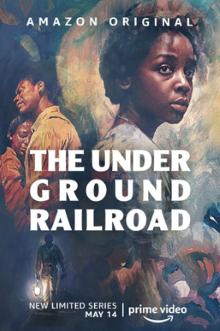This wouldn’t be my first choice of a television series to watch but my wife mentioned it and it is intriguing to have a faithful adaptation of a novel be directed by Barry Jenkins. My concern was that a series like this would amount to little more than a testament to almost endless suffering. As it turned out, this series is mostly fantasy with little reference to real historical events. That allows it to throw in all kinds of ideas that can be interpreted as metaphors. But that also means it never feels quite real and the series is structured entirely as the main character Cora running from one situation to another with no end in sight, making watching it an unsatisfying experience to me.
Cora Randall is a slave on a typical plantation in Georgia who resents her mother for running away without her when she was a child. After another slave is burned for death, she wants to escape herself and befriends the unusually literate Caesar. He reveals that he knows of the existence of an underground railroad that ferries escaped slaves to freedom. While escaping Cora strikes and seemingly kills a white man trying to apprehend her and so she becomes wanted for murder in addition to being an escaped slave. Cora and Caesar do indeed make it onto a train which takes them to Griffin, a city in South Carolina. Both of them are offered employment, education and accommodation and life at first seems good. But Cora soon realizes that while the whites of Griffin espouse the mission of uplifting blacks, they also want to control their population growth through forced sterilization and use them for medical experiments. Meanwhile a slave catcher Arnold Ridgeway is on their trail with his assistant, a black boy named Homer in tow. Ridgeway had failed to recapture Cora’s mother years ago and he is prepared to chase Cora for however long it takes. He catches up to them just as Cora and Caesar realizes the truth of what is happening in Griffin and so Cora has to run again.
This series and the novel it is based on takes the term underground railroad to mean a literal, physical train that runs in a vast, underground rail network. This premise is inherently fantastical given the physical impossibility of such an effort and this show goes all in portraying it as a mystical, almost dream-like place. It also references early on Gulliver’s Travels as Caesar’s favorite book. So the story as a whole can be seen as a record of Cora’s journeys from one place to another in search of a safe refuge, only to learn that each place ultimate disappoints in different ways. That’s why this version of America is a sort of stitched together pastiche of various extreme scenarios and the world building isn’t meant to be fully consistent or the plot development fully logical. It is horrifying to watch all these permutations of how America mistreats its imported African population including one town that outright bans all black people and kills all those that pass into its borders, and there is value in enumerating how there are more forms of abuse that the traditional slave plantation. The final story, so to speak, shows that even when black people follow all of the rules and obey all of the laws to play nice and productively contribute to the economy, white people will still see it as an unacceptable threat. That said, it is still the traditional slave plantation that I find most emotionally affecting as it is where the scenes feel the most authentic and grounded in reality.
The production values of the show are amazing and one thing that I think the show deliberately tries to do and does get right is to portray a variety of African-Americans of the era in the prosperous, middle-class lives that they could have lead if only they had been allowed to. At the same time, the show reminds me a lot of The Handmaid’s Tale and not always in a good way. It lingers on key moments to add dramatic weight but resorts to the trick too often. It’s also similar in that the premise relies on Cora being trapped in a bad situation that she can’t ever get out of or else there would be no show. This makes the show structurally static as she keeps having to run away. Worse, it makes it so that she keeps having to leave other characters behind so that the only constants, apart from Cora herself, are Ridgeway and his assistant Homer. As such the other black characters are never fully developed and I feel that we don’t even get the full story about the strange relationship between Ridgeway and Homer. Naturally each of the places Cora stops in is in no way as completely realized as Gilead and that makes this unsatisfying as well from the perspective of a science-fiction fan.
As far as I can tell the series is very faithful to its source material so it’s really a question of Jenkins not wanting to add elaboration to each of the towns Cora travels to that were not in the novel. I feel however that allegories that work well in a book doesn’t work so well when realized in such visceral detail in a show. It definitely counts as speculative fiction but it leans too far into the fantasy escapism than I would like. It’s not bad but it’s definitely not the kind of show that I like.
